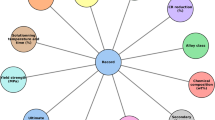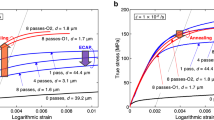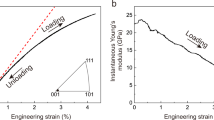Abstract
IT has been shown previously that progressive deformation of an annealed metal breaks down the grains into smaller units, or crystallites, which have a minimum size characteristic of the metal1,2. The lower limiting size for metals so far examined lies in the range 10-4 to 10-6 cm. A precise determination of this size has become of importance, because it appears to coincide with the maximum strength developed during deformation of the metal3.
This is a preview of subscription content, access via your institution
Access options
Subscribe to this journal
Receive 51 print issues and online access
$199.00 per year
only $3.90 per issue
Buy this article
- Purchase on Springer Link
- Instant access to full article PDF
Prices may be subject to local taxes which are calculated during checkout
Similar content being viewed by others
References
Wood, W. A., Nature, 151, 585 (1943).
Wood, W. A., Proc. Roy. Soc., A, 172, 231 (1939).
Gough, H. J., and Wood, W. A., J. Roy. Aero. Soc., 40, 586 (1936).
Wood, W. A., and Rachinger, W. A., Nature, 161, 93 (1948).
Bragg, W. L., Nature, 149, 511 (1942).
Author information
Authors and Affiliations
Rights and permissions
About this article
Cite this article
WOOD, W., RACHINGER, W. Strength of Metals. Nature 162, 891–892 (1948). https://doi.org/10.1038/162891a0
Issue Date:
DOI: https://doi.org/10.1038/162891a0
This article is cited by
-
Secondary structure of crystals
Journal of Structural Chemistry (1995)
-
Strengths of Metals
Nature (1949)
Comments
By submitting a comment you agree to abide by our Terms and Community Guidelines. If you find something abusive or that does not comply with our terms or guidelines please flag it as inappropriate.



